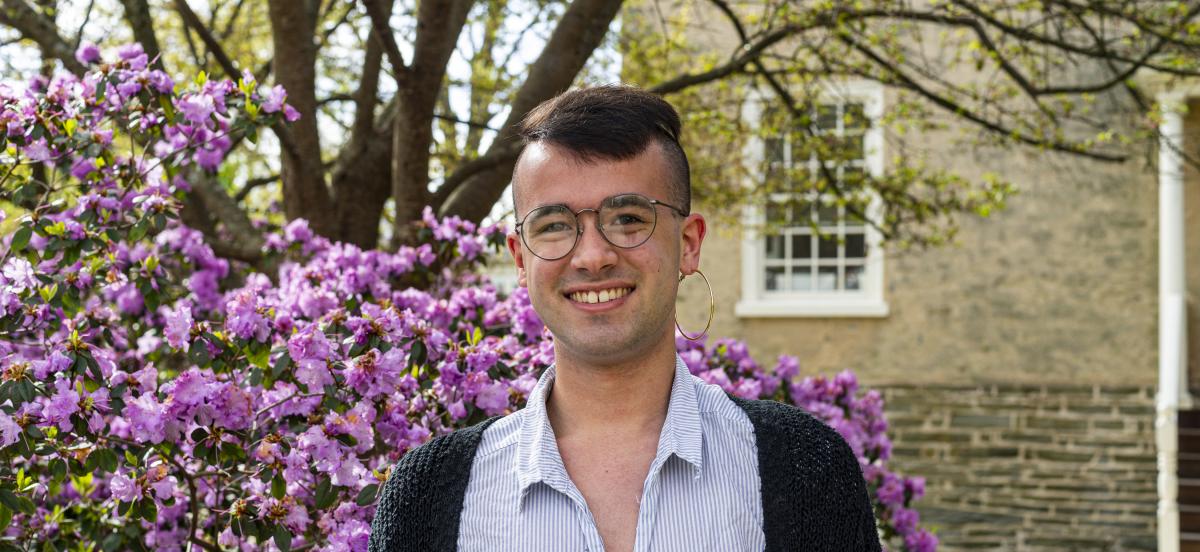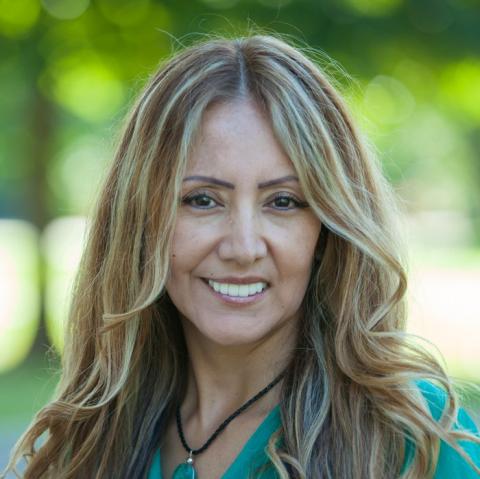Senior Spotlight

Details
Robbie Spratt is completing his BA in French at Haverford this Spring '21
The Proust Questionnaire – Robbie Spratt ‘21
The Proust Questionnaire has its origins in a parlor game popularized (though not devised) by Marcel Proust, the French essayist and novelist, who believed that, in answering these questions, an individual reveals their true nature. Here is the basic Proust Questionnaire.
- What is your idea of perfect happiness?
I think my idea of perfect happiness is being at peace with oneself. Being with friends and family and not having a care in the world is ideal!
- Which living person do you most admire?
I really admire Sidney Gish’s music. She addresses a lot of heavy subjects with a certain levity that I find really calming sometimes, and I appreciate the care she takes with her music and lyrics.
- What is your greatest extravagance?
I definitely spend way too much on clothes.
- What is your current state of mind?
Currently, a bit fried with finals work, but also extremely proud to be graduating and finished with thesis!
- Which words or phrases (in French) do you most overuse?
Ever since I studied in Paris, I have used the phrase “du coup” at least once in almost every conversation I have. A French university friend of mine told me that phrase would make me sound “more like a native,” so it has permanently entered my vocabulary at this point.
- Which talent would you most like to have?
I would love to be a great dancer – I find that dance is such a skillful art form and, while I’m not the best at it myself, I appreciate those who do.
- What do you consider your greatest achievement?
Honestly, making it through to college graduation through a global pandemic is my greatest achievement to date!
- If you were to die and come back as a person or a thing, what would it be?
I think it would be great to come back as a succulent – I already have so many in my room.
- What do you most value in your friends?
I value and choose friends who are honest and fun-loving. I’m definitely an extrovert who can’t sit still, and I love people who can match that energy.
- Who are your favorite French/francophone writers?
Mariama Bâ, a Senegalese writer who authored Une si longue lettre, and Anouar Benmalek, an Algerian writer who authored Fils du Shéol absolutely changed my life. Both of these works are poignant pieces about a variety of difficult subjects, and both pretty much moved me to tears. They have provided a perspective on French-language literature that I feel is missed sometimes, and I enjoyed the way they were able to not only provide this perspective but also become great storytellers as well.
- Who is your hero of French/francophone fiction?
While he’s far from perfect, I do think Guillaume Dustan in his autofiction Dans ma chambre may be my hero of Francophone fiction. He moves through the world so unabashedly and shamelessly, and that is something I strive to emulate myself. Sometimes this can lead him to making big mistakes, but he also admits this openly, which is another lesson that I’ve learned from him.
- Who are your heroes in real life?
My parents! They’ve provided me so much, especially with unexpectedly moving back home last March and dealing with the pandemic in real time.
The Haverford Questionnaire
- What is your greatest memory of your time at Haverford?
There are so many to choose from, but Haverfest this past year was a really special weekend to me for a lot of reasons. It was awesome to just be on Founders Green with all my friends and relax before the chaos of finals began. The weather was great too, so it was a perfect way to end senior year.
- What is your greatest memory from study abroad?
My program in Paris took us on a trip to Mont St. Michel, which was absolutely breathtaking. We took a walking tour around the entire island and walked through the quicksand for about 3 hours and had the rest of the day to explore the monastery and eat great food. Next time I’m in France, I will definitely be going back.
- Which F/F author do you most identify with?
I really admire Charles Baudelaire’s poetry and think I identify with him the most. Much of his poetry deals with how we move through the world and where we derive our own happiness from. He definitely loved being a part of the crowds of people and flâneurs on the streets of Paris, and I feel the same!
- Why did you choose to study French?
My mother used to be a middle school French teacher, and later earned her Ph.D. in French history, so the French language has always been present in my childhood. Originally, I just decided to take French in high school and continued in college to fulfill my language requirement, but there was something about learning another language and being able to truly express myself to a whole new cultural audience that I found so fascinating. Being able to improve my fluency while going abroad and truly using a second language to create friendships has been an invaluable part of my majoring in French. And, of course, I also love French pastries!
- What is the title of your senior thesis?
My thesis is titled “‘Dire ou ne pas dire ?’: Le Silence abject et la politique du langage dans la littérature du sida” / “‘To Speak or Not to Speak?’: Abject Silence and the Politics of Language in Parisian AIDS Literature.”
- What is your funniest or most awkward cross-cultural moment?
My host parents in Paris – who were themselves university professors and pretty proficient in English – would often serve certain foods for dinner that they didn’t know the English translations for and that I didn’t recognize in French. There were a lot of meals that I had to go through my dictionary afterwards to see what it was I actually ate! That being said, it was delicious every time and it was great to try a lot of new dishes. My host dad grew up in Tours, so a lot of these unknown meals were different kinds of regional dishes from the Loire Valley region of France.
- Which expression or word is your favorite in the French language?
I’ve always found the word for “butterfly” (“papillon”) to be a very pretty-sounding word!
- Which expression or word is your least favorite in the French language?
Parisians love to use the phrase “Ce n’est pas possible” (“It isn’t possible”). Instead of meaning that something literally isn’t possible, they use it to mean that they could not accommodate for something in particular, which was a bit tricky to understand for a while.




